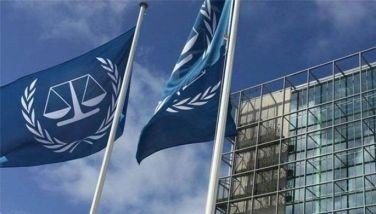Meralco set to pay penalties
MANILA, Philippines - Power utility giant Manila Electric Co. (Meralco) will start paying some P100 million worth of penalties to its customers next month.
Meralco president Jose de Jesus, in an interview over the weekend, said some 800,000 customers will benefit from the fine pay-up.
He said customers will be notified accordingly if they will be given rebates from Meralco.
“By September we will be paying out fines to customers. Customers will most likely get their rebates as credit to future billings,” De Jesus said, adding that a second round of fine payouts will be done in November this year.
But he emphasized that the payout for November will be much lower, around P40 million to P50 million, and will benefit 400,000 customers.
He said the paying out of penalties to customers is part of the good features of the performance-based rate (PBR) mechanism, a new rate setting method approved by the Energy Regulatory Commission (ERC) that will penalize a distribution utility like Meralco if it will not be able to meet certain standards set under the new rate scheme.
De Jesus said the company is somewhat paying the penalties in advance as the regulatory period for PBR has yet to end in 2010.
He said the penalties were computed by the company based on the frequency of interruption time, failure to meet deadline of connection to customers, among others.
“We have been closely monitoring our compliance with the ERC rules on PBR. We have been accurately tracking all these penalties,” he said.
The power company chief stressed that this shows that PBR works well as customers and the utilities will both benefit from the new rate-setting scheme.
“Our rate applications will be approved and disapproved by the ERC based on our performance,” he said.
Getting even
Under the PBR, Meralco will follow certain Guaranteed Service Levels (GSLs) indicators, a feature that would assure the public of a high-level performance distribution utility.
Under the GSL, customers are compensated if the utility is not able to meet performance thresholds in duration and frequency of power interruptions, restoration time and connection time.
This means that a customer will receive monetary compensation depending on the degree of service given by Meralco.
For instance, if Meralco will not be able to connect power to a customer more than one day late, the payout to customer will be P47 per day.
On the other hand, PBR also provides incentives to distribution utilities to optimize the use of existing and future assets and to reduce costs without sacrificing service delivery.
“This is in contrast to the cost-plus regulation under the return-on-rate-base (RORB) regime,” he said.
PBR will allow for the implementation of Performance Incentive System (PIS) in which a utility firm will receive incentives if it will be able to meet some indicators such as containing system loss, interruption frequency rate, probability of voltage levels, average time to process application, average time to connect premises, and call center performance.
Meralco was the latest addition to the first wave of entrants placed under PBR, alongside Cagayan Power and Light Co. (Cepalco) and Dagupan Electric Corp. (Decorp), which implemented PBR-based rates in October 2008.
Cotabato Light, Iligan Light and Mactan Electric also began implementing PBR last May.
PBR is widely practiced for the wires business in the US, UK, Australia and New Zealand.
The ERC, the country’s power sector watchdog, has placed Meralco under the PBR effective May this year.
Under the PBR, Meralco has been allowed by the ERC to increase its distribution charges by an average of 25.7 centavos per kilowatt-hour.
Meralco now has a pending application with the ERC to adjust its rate under PBR by an average of 27 centavos per kwh.
Based on the PBR rules, Meralco could update and change its distribution charge every year taking into consideration some factors such as inflation rate and foreign exchange movements.
“Under ERC’s PBR rules, Distribution Utilities (including Meralco) have to go back to ERC every year to make a verification filing. ERC will verify if the initially assumed inflation and forex rates are still correct. ERC also verifies the incentives/penalties (as the case may be) the DU will get based on its operating performance vis-a-vis targets set by the ERC,” Meralco said to explain the move to adjust the distribution charges.
Mikey Arroyo: No way
But the eldest son of President Arroyo has vowed to block the request of the Meralco for an increase in power rates next year, which should be within the firm’s profit margin, and not at the consumers’ expense.
Pampanga Rep. Juan Miguel “Mikey” Arroyo, chairman of the House committee on energy, said he will closely monitor and coordinate with the ERC regarding the power retailer’s request for 38-centavo per kilowatt-hour increase.
“I will closely coordinate with the ERC on this matter and make sure that if ever an increase in power rates is inevitable, it will be justified and that it would not be used just to milk the people of their hard-earned money,” said the presidential son.
In defending its petition for a rate increase, Meralco said it needed to further improve its services and fund expansion programs. The hike is also justified under its PBR scheme for its distribution, supply and metering charges.
But Arroyo seems unconvinced.
“It’s really disgusting to hear that while Meralco is set to roll back power rates this month by at least 14 centavos per kWh, they have also filed a petition before the ERC for a power rate increase at the start of 2010,” he said.
“It is not a crime to make profits out of your business, as long as it is not gained through shotgun tactics. And the timing of the power rate increase is equally disgusting. It’s like having us enjoy the Christmas holidays only to wake up the next day knowing you will be saddled with additional expenses,” the young lawmaker added.
“What are their real intentions to hike power rates? To improve its services or to jack up profits? Meralco is saying that they will use the revenue to be gained from the power rate increase to further improve its services and fund its expansion programs. But at the same time, they are also projecting an income of between P13 to P15 billion after the increase,” he said.
Jacking up the profit
Based on its petition, Meralco proposed a distribution rate of P1.1858 per kwh for users consuming 201 to 300 kwh per month from 87.65 centavos per kwh (based on July figures) which translates to an increase of 30.93 centavos per kwh.
The company also proposed a supply and metering charge of 58.30 centavos and 41.80 centavos per kwh from 52.71 centavos and 24.35 centavos per kwh, or an adjustment of 5.59 centavos and 17.35 centavos per kwh, respectively.
If computed using the August figures, Meralco’s distribution charge will be 99.53 centavos per kwh, supply charge at 47.20 centavos and metering charge of 33.80 centavos per kwh or an increase of 19.05 centavos per kwh for distribution, 11 centavos per kwh for supply and 8 centavos per kwh for metering charge or a total increase of 38.05 per kwh.
Meralco also noted the ERC’s guidelines for implementing the PBR, that there are parameters on how the new Maximum Allowable Price (MAP) will be computed and this covers the consumer price index, peso-dollar exchange rate, performance incentives and any correction due to previous periods’ under or over-recovery.
“Meralco’s constrained MAP for regulatory year 2010 or the period July 2009 to June 2010 is P1.4917 per kwh. This is the computed rate after the side constraints have been applied to prevent price shocks to customers,” the company added.
At the same time, Meralco pointed out that it also included the impact of the “global slowdown on their consumption figures.”
Meralco said that from January to June of this year their sales dropped. However, it did not reach 15 percent to merit any decision to change their capital expenditures as well as maintenance forecast.
“There are indications that the slowdown has bottomed out and the economy may recover in the fourth quarter of the year. Thus, any significant downscaling in costs may be inappropriate considering the possible rebound in the economy,” Meralco said.
Last April, the ERC granted Meralco a MAP of P1.2227 per kwh or an increase of 25 centavos per kwh. – Delon Porcalla
- Latest
- Trending































